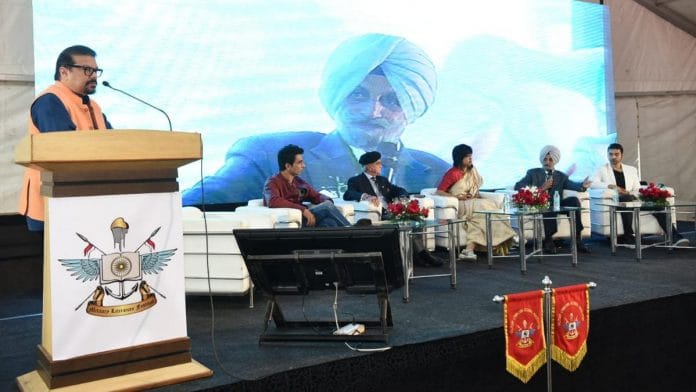On the second day of the Punjab government’s Military Literature Festival in Chandigarh, panelists also discussed the media’s role during 26/11.
Chandigarh: A retired lieutenant general of the Indian Army Saturday called for public debates on matters pertaining to national security and the defence forces, and deeper interactions between the government and the military.
Lt Gen N.S. Brar (Retd) made the remarks as he participated in a panel discussion on Day Two of the Military Literature Festival in Chandigarh, organised by the Punjab government in recognition of the state’s many warriors.
Addressing a session on the lack of openness in the Army, he added, “When you say openness, it does not necessarily mean anything and everything [should] be open,” he said, adding, “It certainly means what is of interest to the general public and the nation at large…and for the higher good.”
“A simple example I would like to give here is your defence spending and acquisition,” he added. “There is no debate. In fact, in one of the budgets presented, not a word was spoken about what has been allocated to defence, and Parliament passes the Budget,” said Brar, a decorated officer who has earlier served as deputy chief of the Integrated Defence Staff.
“Why should the public not know how the defence money is being spent? The Army feels that it is not getting enough, and unless the public class questions why the Army is not getting enough, the politicians will not answer.”
Also read: No govt sincere in tackling terrorism, says 26/11 hero Major Unnikrishnan’s father
26/11 and the media
A subsequent session saw panelists engage in a discussion on ‘valour, history, politics and media’, where the media’s role during 26/11 was among the subjects taken up.
Moderating the session, veteran journalist Vir Sanghvi said that the media had failed to play the role expected of it during 26/11, when live coverage of the National Security Guard (NSG) operation in Mumbai was alleged to have worked to the terrorists’ advantage.
Everyone knew about the fact that complicated response systems were being used to pass on information to the handlers back in Pakistan, he added.
However, channels continued to show the attack in real time, which had serious consequences for our men and lives were lost, he said.
Sanghvi added that this could be blamed on the TRP wars rampant among TV channels, while also faulting the government’s response to the attack.
One of the panelists, journalist Aarti Singh, sought to defend the media coverage. Noting that she was among the journalists who covered the attack on the Taj Hotel in Mumbai, she said that most reporters present in the control room had no idea what was going on. Even the public relations divisions of the Army and the government, she added, did not know how to guide the journalists.
It was two days into the four-day siege, she said, that directions were issued to the media not to cover the attack in real time. “It was a first-of-a-kind situation for everyone and nobody was trained or had any prior instructions,” Singh added, “As a result, things played out in the manner that they did.”
She said it was essential for the government to organise training sessions for journalists so they can cover war and terror attacks more responsibly.
Fellow panelist Lt Gen T.S. Shergill (Retd), a war veteran and adviser to Punjab chief minister Captain Amarinder Singh, said the media should play a proactive role in boosting the morale of the armed forces, but added that restraint was in order when reporting on defence matters of a sensitive nature.
Also read: India’s military retains 4thspot in global ranking, Pakistan drops to 17







With the army jawan involved in the Bulandshahr violence, it seems that communal disharmony and communal disharmony is slowly creeping into our armed forces. This doubt NEVER was there all this time. The entire nation has been exposed to communal hatred and distrust. How can there be SAB KA VIKAS when there is no SAB KA VISHWAS. Progress will never happen in a country when there is communal stress and disharmony. We all forget, and more so the self proclaimed politicians, that we are first human beings before we are nationals of any country. Religion, culture, food and traditions are all personal provided they do not infringe on the common NATURAL RIGHTS of an individual. We should pledge first to respect and love fellowmen before we brand them as anti national.
Unfortunately our country has so called terrorists classified as Tribal Naxals, and tribal Maoists. Recently a new class of terrorists has been classified as Urban Naxals and Maoists. I am yet to know the reasons for our own countrymen revolting against our own government. Unfortunately any investigation into this matter is considered and termed anti national and citizens with distinguished credentials are arrested and jailed by the authorities under suspicion. Why not ask the “Naxals/Maoists and the “Urban Naxals/Maoists be called for an honourable and fair and open discussion to understand the problems, difficulties, and issues faced by the suspect citizens. Let there be a coming together of sociologists and other academics and the government to resolve issues rather than just accuse, kill and jail our own citizens.
Prof PK Sharma,Freelance Journalist,Barnala(Punjab)
Lt.General N.S. Brar(Retd) ‘s observations in the Military Literature Festival are quite up to the mark !
He has very strongly advocated in favour of more transparency and openness in sharing of the defence
budget with the masses ! There should be no problems in it !
Prof PK Sharma, Freelance Journalist
Pom Anm Nest,Barnala (Punjab)